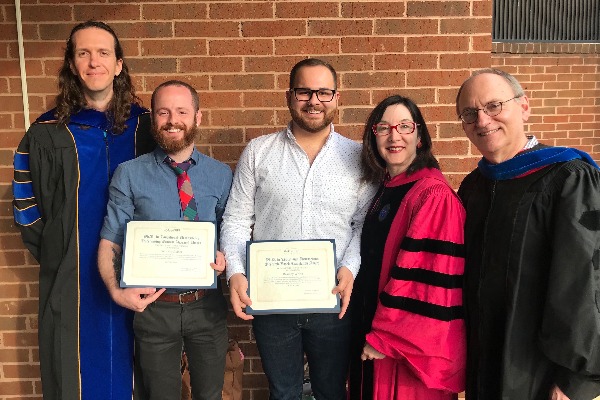PEN Students Honored with Distinguished Awards at Gallaudet University’s Graduate Awards and Hooding Ceremony

PEN students, Mr. Geo Kartheiser and Mr. Bradley White were honored with distinguished awards at Gallaudet University’s Graduate Awards and Hooding Ceremony on May 10, 2018.
The PhD in Educational Neuroscience (PEN) program is delighted to honor graduate student Geo Kartheiser, with the PEN program’s 2018 Outstanding Research Award. This award honors a student who has consistently demonstrated outstanding research and scientific scholarship, originality and creativity in his or her science, and scholarly achievements in research commensurate with the highest standards of Cognitive Neuroscience and Educational Neuroscience.
While only in his first year in PEN, Mr. Kartheiser was the first graduate student in Gallaudet’s history to win the highly esteemed NIH "F31" Predoctoral Award to conduct cognitive neuroscience research with his Advisor Dr. Laura-Ann Petitto in the Brain and Language Laboratory for Neuroimaging (BL2).
While in PEN, he co-authored three peer-reviewed journal publications, and two book chapters. He also co-authored and presented at 15 national and international scientific meetings, including prestigious invited public science lectures at the University of Hong Kong, and eight peer-reviewed professional presentations around the world.
Mr. Kartheiser’s contributions went beyond what was expected of a student: As an outstanding and passionate teacher of science, he mentored eight Gallaudet undergraduate and graduate students, imparting complex and new knowledge about neuroimaging methods and theory.
Of distinction, his highly original doctoral dissertation research reflects masterful scientific reasoning and discoveries and is poised to be a lasting contribution to science. In it, he explores how the timing of signed language exposure in early life may impact individuals’ spatial working memory performance as well as provide enhancements to the human brain. The findings also have great educational neuroscience potential for shedding new light on how learning a signed language can enhance higher cognitive functions in all adults and children.
The PhD in Educational Neuroscience (PEN) program also honored graduate student Bradley White, with the PEN program’s 2018 Outstanding Research-based Translation Award.
The PEN program Outstanding Research-based Translation Award honors a student who has made a significant contribution to the translation of basic scientific discoveries in Cognitive Neuroscience and Educational Neuroscience through the advancement of an origin creation or contribution that has the potential to transform society, policies, and individual lives spanning the nation and world.
Mr. White (Dr. Clifton Langdon, Advisor), excelled in Dr. Melissa Herzig’s Translation course and worked with Dr. Langdon, director of the Laboratory for Educational Neuroscience (LENS).
As a PEN student, Mr. White brought his own unique insights, creativity, and perseverance, and ultimately exceeded in creating an original Translation work of such powerful science and educational significance impacting the medical, clinical, and educational professions, members of the public (parents and community) and public policy in the United States.
Mr. White’s translational focus is focused on optimizing young children’s vocabulary development, and it has a strong potential to support educators and parents in the early stages of language acquisition and supports transformation of the way we think about bilingualism and educating deaf children.